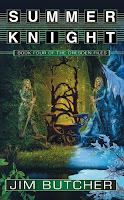The galaxy of Ulubis has been disconnected from the rest of the "meta-civilization" when its wormhole portal is destroyed by Beyonder terrorists, but now, because of something inadvertently discovered by Seer Fassin Taak, two separate fleets are racing through deep space to attack or defend Ulubis and retrieve the vital information they think Fassin stumbled across-- a transform to find and access the long-thought mythical Dweller List, a wormhole network set up by the ancient gas-giant Dwellers centuries ago. Fassin is a scholar of Dweller Studies, caught up in the politics and bureaucracy by the order of the Mercatoria. While all the preparations for war and defense are going on, he is sent back to the gas planet Nasqueron to try to find the information that everyone is fighting for. Most of the story follows Fassin, but we get other parts of the story through Fassin's flashbacks, his friends Saluus Kehar, a rich industrialist, and Taince, a military officer with the fleet racing to Ulubis' defense, as well as glimpses of Lusiferous the Archimandrite, the ruthless and vicious head of the fleet coming to attack Ulubis. Banks has created a rich, dense universe populated with fascinating creatures (so many ideas here just thrown into the background could be a full story) and a compelling plot with a pretty satisfying resolution.
One of the undercurrents to this book is the existence of AIs. The current reigning bureaucracy hunts them down and destroys them, and often people use technologies that are "dangerously close" to full-blown AI. In fact, I noticed early on that the few instances of first-person narration all seemed to be AIs; most of the book is in third person, so this is an interesting (and, no doubt, quite intentional) choice-- it's subtle, but it seems to underscores the "personhood" of the AIs. I hoped and suspected that AIs would play into the story, and was delighted when one of the most interesting and strange characters turned out to be one.
There are so many interesting creatures and ideas here. The Dwellers themselves are fascinating (although I can't quite picture them visually from the strange description); they seem childish and silly, but they are the oldest known civilization still living in the galaxy, spread to all gas giant planets billions of years ago, and individuals can live for centuries. Species are divided into Slow (like Dwellers) and Quick (like humans), both for how they sense time's passing and (more importantly) for how long their civilizations endure. Dwellers are impossible to coerce or bribe, both because they are basically indifferent to most of what goes on outside their planets (during the invasion of Ulubis, almost all of the news Fassin can find is about the "play" war the Dwellers are conducting on Nasqueron), but also because their only form of money is the "kudos" that they receive from each other.
There are many fascinating "by the way" ideas that Banks throws in just as background for this universe. For instance, aHumans and rHumans-- some humans were taken from earth and helped to develop so that when the "remainder" humans finally developed their technology and made it into space, they discover that they aren't the only or even most developed humans out there. Or the Morbs, death-obsessed races such as the bird-like Ythyn who roam space collecting and preserving the dead of all kinds. The water-worlder Sceuri, like a huge eel with a folding sail-wing on its back. Or the moment when Fassin finds out his family has been killed and contemplates revenge, and ponders the fact that so many were involved in the destruction (military commanders, the person who launched the weapon, the people who built it, those who started the conflict, etc) that he can't possibly identify who was actually responsible. Also compelling: the Machine War against the AI (centuries ago) ended not because the biologicals won, but because the AIs recognized they could wipe out all of the biologicals and decided not to, and instead went into hiding.
I was a good chunk of the way into the book before I had any idea what the title meant. The Algebraist is the title of an ancient epic poem about a space voyage-- Fassin traded with a Dweller for this book, and it was in a footnote of the first volume that others discovered a reference to the key to the Dweller List. Eventually, Fassin discovers the alien algebra that is the answer he was sent to look for, and first thinks it is a joke-- but eventually figures out the answer is simpler than anyone could have guessed (it seemed like the perfect, satisfying answer to me, drawing together clues from earlier, seemingly unrelated parts of the story). But it also seems to me that the idea of algebra also links to the AI, especially because the first use of the word algebra in the novel is by an AI in hiding that knows it will soon be discovered and destroyed, meditating on the idea of revenge,
... the price its enemies all deserved to pay-by any algebra of justice under any sun you cared to name-for their intolerance, their savagery, their generacide...
Caveats for the sensitive reader: lots of swearing (even Dwellers occasionally use the f-word, which seemed strange-- translated into human?), some sex scenes, and some gruesome violence (presumably to establish how horrific and amoral Luseferous is, but still quite disgusting).
| Title: | The Algebraist |
|---|
| Author: | Iain M. Banks |
|---|
| Date published: | 2004 |
|---|
| Genre: | Science Fiction |
|---|
| Number of pages: | 434 |
|---|
| Notes: | recommended and loaned by Pete |
|---|




